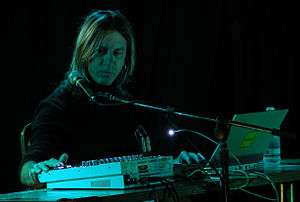William Basinski
William Basinski (born 25 June 1958) is an American avant-garde composer based in New York City.[1] He is also a clarinetist, saxophonist, sound artist, and video artist.[2]
William Basinski | |
|---|---|
 Basinski performing live at the Empty Bottle in 2005. | |
| Background information | |
| Born | June 25, 1958 Houston, Texas, U.S. |
| Genres | |
| Occupation(s) | Composer |
| Years active | 1978–present |
| Labels |
|
| Associated acts | Richard Chartier |
| Website | www |
Basinski is best known for his four-volume album The Disintegration Loops (2002–2003), constructed from rapidly decaying twenty-year-old tapes of his earlier music.[3]
Biography
William Basinski was born in 1958 in Houston, Texas.[2] He was raised in a Catholic family,[4] and states that he had his first "really mystical, wonderful, magical" musical experiences as an infant at Houston's St. Anne Church.[5] His father was a scientist contracted to NASA, which caused the family to move often.[5] Basinski says he knew that he was gay from an early age. [6]
A classically trained clarinetist, Basinski studied jazz saxophone and composition at North Texas State University in the late 1970s. In 1978, inspired by minimalists such as Steve Reich and Brian Eno,[7] he began developing his own vocabulary using tape loops and old reel-to-reel tape decks. He developed his meditative, melancholy style experimenting with short looped melodies played against themselves creating feedback loops.[2]
His first release was Shortwavemusic. Although created in 1983, it was first released on vinyl in a small edition in 1998 by Carsten Nicolai's Raster-Noton sub-label. This was followed by Watermusic, self-released in 2000 on Basinski's 2062 Records. Another 2-disc work was Variations: A Movement in Chrome Primitive, 1980: it was finally released in 2004 by David Tibet on the Durtro/Die Stadt label. At the time this work was created, Basinski was experimenting with compositions for piano and tape loops.[2]
Throughout the 1980s, Basinski created a vast archive of experimental works using tape loop and delay systems, found sounds, and shortwave radio static. He was a member of many bands including Gretchen Langheld Ensemble and House Afire. In 1989, he opened his own performance space, "Arcadia" at 118 N. 11th Street.[8] On one occasion, he opened for David Bowie, playing saxophone with rockabilly band The Rockats. [6] Basinski would later dedicate a track from A Shadow in Time to Bowie.
In August and September 2001, he set to work on what would become his most recognizable piece, the four-volume album The Disintegration Loops.[2] The recordings were based on old tape loops which had degraded in quality. While attempting to salvage the recordings in a digital format, the tapes slowly crumbled and left a timestamp history of their demise.[9][10][11][12]
Discography
Studio albums
- Shortwavemusic (1998, Raster-Noton)
- Watermusic (2000, 2062 Records)
- The Disintegration Loops (2002, 2062 Records)
- The River (2002, Raster-Noton)
- The Disintegration Loops II (2003, 2062 Records)
- Watermusic II (2003, 2062 Records)
- Melancholia (2003, 2062 Records)
- The Disintegration Loops III (2003, 2062 Records)
- A Red Score in Tile (2003, Three Poplars)
- The Disintegration Loops IV (2003, 2062 Records)
- Variations: A Movement in Chrome Primitive (2004, Durtro/Die Stadt)
- Untitled (2004, Spekk) (with Richard Chartier)
- Silent Night (2004, 2062 Records)
- The Garden of Brokenness (2006, 2062 Records)
- Variations for Piano and Tape (2006, 2062 Records)
- El Camino Real (2007, 2062 Records)
- 92982 (2009, 2062 Records)
- Vivian & Ondine (2009, 2062 Records)
- Aurora Liminalis (2013, Line) (with Richard Chartier)
- Nocturnes (2013, 2062 Records)
- Cascade (2015, 2062 Records)
- The Deluge (2015, 2062 Records)
- Divertissement (2015, Important Records) (with Richard Chartier)
- A Shadow in Time (2017, 2062 Records)
- Selva Oscura (2018, Temporary Residence Limited) (with Lawrence English)
- On Time Out of Time (2019, Temporary Residence Limited)
- Hymns of Oblivion (2020, self-released)
Compilation albums
- The Disintegration Loops (2012, Temporary Residence Limited)
See also
References
- Lester, Paul (11 October 2010). "New band of the day – No 884: William Basinski". The Guardian.
- "William Basinski | Biography & History". AllMusic.
- Medwin, Marc (1 October 2012). "William Basinski - The Disintegration Loops". Dusted Magazine.
- Gotrich, Lars (November 15, 2012). "Divinity From Dust: The Healing Power Of 'The Disintegration Loops'". NPR.
- Beaumont-Thomas, Ben (10 April 2019). "'I wanted to be David Bowie': music maverick William Basinski". The Guardian.
- Beaumont-Thomas, Ben (April 10, 2019). "'I wanted to be David Bowie': music maverick William Basinski". Theguardian.com.
- Catalano, Nicola (2004). "William Basinski + Richard Chartier interview". spekk. Retrieved 17 July 2012.
- "William Basinski". Flaunt. Retrieved 16 August 2014.
- Tangari, Joe (8 April 2004). "The Disintegration Loops I-IV - Review". Pitchfork. Retrieved 27 July 2011.
- Simmons, Ian. "The Disintegration Loops - Review". nthposition. Archived from the original on 13 April 2009. Retrieved 27 July 2011.
- Mason, James. "Disintegration Loops 3 - Review". AllMusic. Retrieved 27 July 2011.
- Levaux, Christophe (2014). "William Basinski, The Disintegration Loops. De l'érosion de l'espace sonore. L'antithèse totaliste". Revue et corrigée (101): 24–27.
External links
- Official website

- William Basinski discography at Discogs
- William Basinski on IMDb